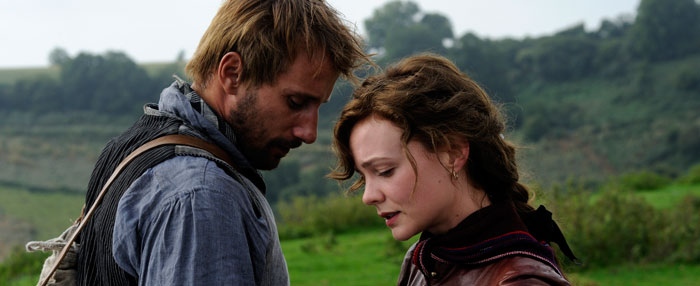FAR FROM THE MADDING CROWD
Fox Searchlight Pictures
Reviewed by: Harvey Karten for Shockya . Databased on Rotten Tomatoes.
Grade: B+
Director: Thomas Vinterberg
Screenwriter: David Nicholls
Cast: Carey Mulligan, Matthias Schoenaerts, Michael Sheen, Tom Sturridge, Juno Temple
Screened at: Dolby88, NYC, 4/18.15
Opens: May 1, 2015
The ignoble strife that forms a theme in “Far from the Madding Crowd” exists within the Victorian society in which Thomas Hardy’s novel is located. But the principal strife is within the mind of Bathsheba Everdene (Carey Mulligan), an independent woman who suddenly inherits her uncle’s farm and becomes the mistress, or employer, of some two dozen farm hands. Whenever Bathsheba has time to think of her future separate from her position on the farm—her love life, that is—she must juggle the petitions of three different kinds of men. The eternal triangle becomes rectangular in Danish director Thomas Vinterberg’s recreation of the Victorian classic as adapted for the screen by David Nicholls. Thanks in part to robust lensing in England standing in for scenes two hundred miles west of London, but more important some excellent casting with Carey Mulligan in the lead role, this “Far from the Madding Crowd,” perhaps even more than the 1967 version that stars Julie Christie, is of a kind that Mr. Hardy would welcome and endorse.
With a feminist overlay that helps make this mid-19th Century tale relevant to the present, Mulligan performs in the role of a young woman who considers herself too independent to accept a proposal of marriage. Yet by stating that if she is to accept a man as her husband, he must have the ability to tame her, she may be running afoul of current women’s rights advocates like Gloria Steinem. She makes this admission to Gabriel Oak (Matthias Schoenaerts), a shepherd who comes across at first as wooden as his name, professing that she needs someone other than this strong, silent type to cut her independence down. Nor is she willing to settle for a life of luxury when entertaining a marriage proposal from William Boldwood (Michael Sheen), a landed aristocrat who promises jewelry and land that would give her protection for life. Alas, he is already forty years old and she needs more passion in her men and fails to feel the rush of blood within. These she finds, unfortunately, when she accepts a marriage offer from Sergeant Frank Troy (Tom Sturridge), a dashing soldier with a scarlet uniform who, in an example of swordplay cuts lock from the trusting woman’s hair while standing eight feet away. Too bad Sergeant Troy’s heart really belongs to Fanny Robin (Juno Temple), whom he has made pregnant, but who on their wedding day confuses the location of the church, resulting in his being left at the altar. Say what you want about the ubiquity of texting and cell phones nowadays: such inventions would have changed the lives of the sergeant, his sweetheart, and Bathsheba, whom the sergeant marries for the money that would feed a gambling habit that would leave the independent lass in hock.
This movie adaptation condenses the book’s content, of course, though pages and pages of description are easily subsumed on the screen—events such as a fire that destroyed farm houses, a devastating decision by a border collie resulting in the demise of two hundred of Gabriel’s sheep, and a storm that threatens the harvest of Bathsheba’s farm. If a happy ending is what the movie public wants, Mr. Hardy’s ghost in combination with David Nicholls’ screenwriting and Thomas Vinterberg’s direction, gives us what we want since, after all, a woman like Bathsheba deserves the romantic satisfactions she secretly and dearly wants and provides appropriate justice to the three men, each of whom has flaws. The film is not without humor, as when the rich William Boldwood, in a self-deprecatory marriage proposal, suggests that she might say “yes” to him out of pity and guilt, to which he offers, “but that’s OK.”
The title comes from Thomas Gray’s poem (1751) “Elegy Written in a Country Churchyard,” a meditation on death and remembrance. “Far from the madding crowd’s ignoble strife/ Their sober wishes never learn’d to stray,” which in turn came from William Drummond’s work (1614) “Farre from the madding Worldlings hoarse discords,” which in turn owes much to Edmund Spenser’s (1579) “But now from me hys madding mind is starte/ And woes the Widdows daughter of the glenne.”
Rated PG-13 119 minutes. (c) Harvey Karten, Member, New York Film Critics Onlin
Story – B+
Acting – A-
Technical – A-
Overall – B+


